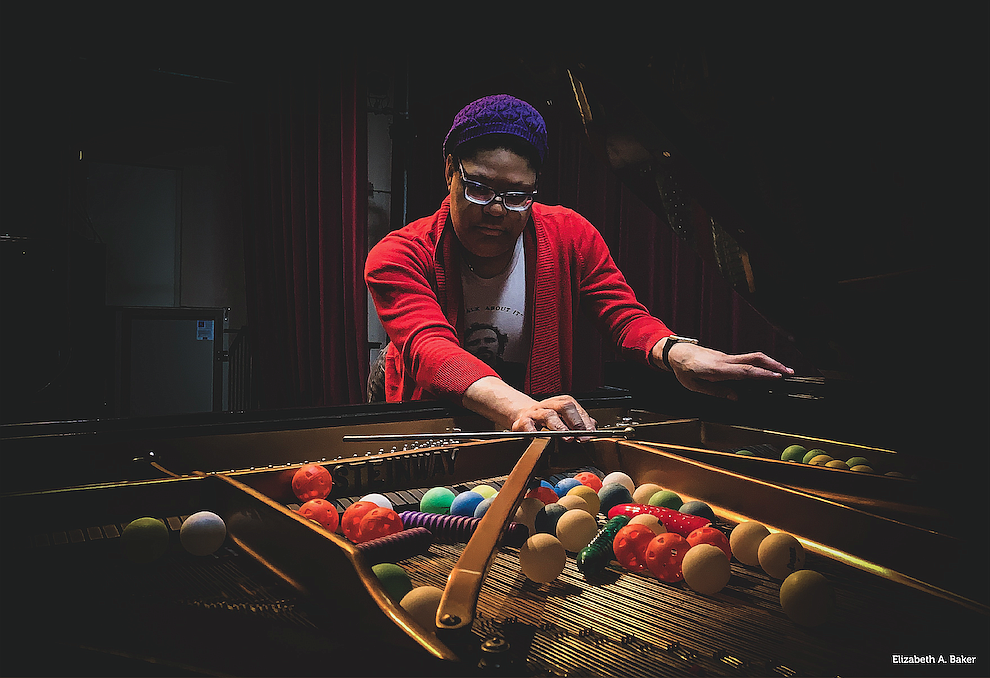- May 6, 2025
-
-
Loading

Loading

EnsembleNewSRQ continued its journey in current music Oct. 20 as it returned to the First Congregational Church with a program of “Peculiar Dreams.”
Maybe I’m just getting used to Berio’s various “Sequenzas” for solo instruments, or perhaps it was the extraordinary playing of Sarasota Orchestra principal cellist Natalie Helm, but her performance of his “Sequenza XIV” for solo cello (2002) was for me the absolute highlight of the concert.
Helm’s performances are always superbly musical, and she transformed this series of rhythmic thumping, string snapping, scraping glissandos and random rhythms into a more linear and organized performance than I have yet heard in this Berio cycle.
Granted, it was revised at least three times by cellist Rohan de Saram, for whom it was written, with each revision possibly making it more “ear-friendly.”
With all the drumming, scraping and scratching, I couldn’t help but think “Poor Ricky!” “Ricky” is the name Helm bestowed upon her 1803 De Blasio cello, and he is blessed with a lovely warm sonority — but unused in the Berio.
This program of all 21st century music continued with the string quartet of Andrew Norman, given the title “An Index of Peculiar Strokes” (2011). Rather than follow the norm of quartet writing with the four players (Samantha Bennett and Jennifer Best Takeda, violins; Hilary Gamble, viola; and Natalie Helm, cello) combining their separate voices into a musical whole, Norman chose to have the four voices merge into one chordal tone cluster by using only one bow technique for each of the short movements.
Movement titles, such as “Skim, Skip, Up, Scrape, Down, Stammer, and Release,” defined each technique while the sounds produced varied from stacked diatonic harmonies and ethereal tone clusters to country-like hoedown fiddling.
Composer Elizabeth A. Baker was present to speak briefly about her work “Cosmic Dreams” (2013) before the two final movements were performed. She told us the work was basically autobiographical and painted a picture of “celestial bodies and physic principles on the surface … while shielding deeper hidden meanings.”
Violinists Bennett and Takeda, violists Gamble and Rachel Halvorsen, and cellists Christopher Schnell and Helm were placed around the periphery of the room, and George Nickson presided over the vibraphone at the center rear of the hall.
The resulting “surround sound” was really all-encompassing and ethereal, and it afforded each audience member the opportunity to reach forth into images of outer and inner space. Vaguely tonal and melodic chords and passages gave the impression of one who is trying to say something but just can’t quite find the words. A most interesting and evocative piece of “outer space impressionism.”
Penderecki’s “Sextet” (2000) was the concluding work of the evening, performed by Bharat Chandra, clarinet; Joshua Horne, horn; Han Chen, piano; with Bennett, violin; Halvorsen, viola; and Schnell, cello.
Written for cellist Mstislav Rostropovich and some friends, the sextet is full of chromatics and harkens to the music of Béla Bartok, Dmitri Shostakovitch and a little Sergei Prokofiev. It is thickly scored and proceeds with dirge-like motion through musical dialogues of the instruments, led and punctuated by piercing, almost pleading sounds of the clarinet. A plaintive theme was voiced by the cello then passed to the horn, only to disappear in the unrelenting pace of the music.
Penderecki’s writing could be called “tonality-plus” because the progression stretched our ears with his almost grotesque sounds of tragedy, with the clarinet serving as a musical “narrator” moving everything ahead.
This outstanding performance of the sextet again gave each person in the audience an opportunity to conjure up individualized images as the music directed them.
These well-planned and well-executed concerts by the excellent musicians who make up EnsembleNewSRQ and guided by co-artistic directors George Nickson and Samantha Bennett continue to be a most welcome addition to the new and current music scene in Sarasota. One can only look forward to their next offering, knowing it will open even more doors into what for many is a completely new musical world.